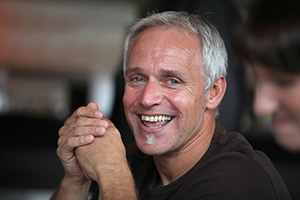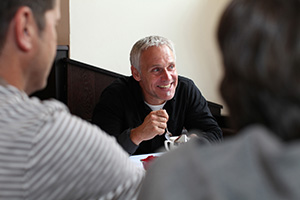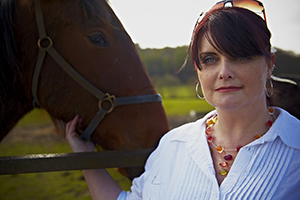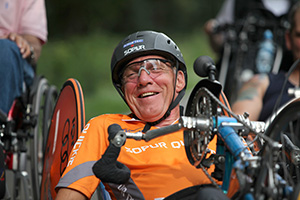Stories of Triumph and Inspiration
Hans Peter Thomas, Germany
“A tall slender man clad in a raincoat, head bent into the wind, traverses the otherwise vacant cobblestone square, clutching a black instrument case. He is heading for the Concertgebouw. Judging from the contours of his case, he is a tuba player. Out of nowhere a young girl, seemingly impervious to the cold (she wears no coat), skips up beside the man waving her arms in the air and fluttering her fingers like a Balinese dancer.”
Hans Peter was 3 years old when his father died. His mother was no stranger to loss and hardship. A stalwart woman, she always bore up well under trying circumstances. It was important to her that her children know happiness, and happiness she gave them, in abundance. She vowed not to betray her sadness. But it was there for all the world to see, as sadness is, in the habitual inwardness of her gaze.
Hans Peter has had his share of loss and hardship, but he would never use such terms to describe his life. Ask him and he will tell you that he is blessed, although he would admit he has not always been inclined to see things that way.
“The greatest lessons hit us hard. Not everyone is able to rebound”, he says. “It’s difficult to ask for help, sometimes even to know you need help, rougher still to accept help when it’s offered.”
“A young boy walks along the Atlantic shoreline picking up starfish that have washed up onto the sand, tossing them back into the sea as he goes. A couple approach and ask him what he’s doing, to which he replies, ‘I’m saving these starfish.’ The man looks up and down the coast and says to the boy, ‘But there are thousands of stranded starfish along this coastline. You can’t possibly save them all.’ Tossing a starfish back into the surf, the boy replies, ‘I saved that one.’”
Handsome, sensitive, fit, with a radiant smile that illuminates his already bright blue eyes, Hans Peter is in many ways living a dream. His beloved, with whom he shares his life, is a source of inspiration and joy; the perfect opponent too. Challenge is good for the soul. Her two children, having to a degree come of age under his watch, think of him as a father. He has the good fortune of working with good people, and they benefit from his tenacity and experience. We give what we give so that others may live. He built his own house in the green enfoldment of south-western Germany and has a second abode in Turkey – land of white sands, cerulean skies and turquoise waters. And while he openly admits that he sometimes wishes he had command of his legs, he harbours no resentment (a “sometimes wish” is a practical mode of acceptance).
Hans Peter enlists in the German army at 19. It isn’t long before his body begins to show signs of debilitation. He falls down. He falls down again. And again. The examining doctor is unable to pinpoint the cause. His condition worsens. He loses control of his bladder. This time a malicious growth lodged in his spinal column is spotted. An operation follows, leaving Hans Peter compromised but not entirely disabled. He can walk but has lost the ability to run. His stint in the army is brief.
Over the course of the next ten years, two more operations occur. “It taught me patience and humility. I learned what it means to be human.” So when, after the fourth operation, Hans Peter lands permanently in a wheelchair, he embraces his new situation with the grace that comes with hard-won acceptance.
“The child with the bright red balloon approaches the man to ask if he really cannot walk. Prompted by the man’s response, the little girl gives him her balloon. ‘Maybe you can fly’, says the child.”
Children are thought to be naive. Idealists, unrealistic. Neither view is entirely true; anyway, opinions are trivial, and views change. There is nothing naive about wonderment nor anything unrealistic about imagination. To know wonder is to know the world anew, over and over and over again. A child wonders with abandon. A man wonders and envisions possibility.
“Naive idealism is a powerful force.”








